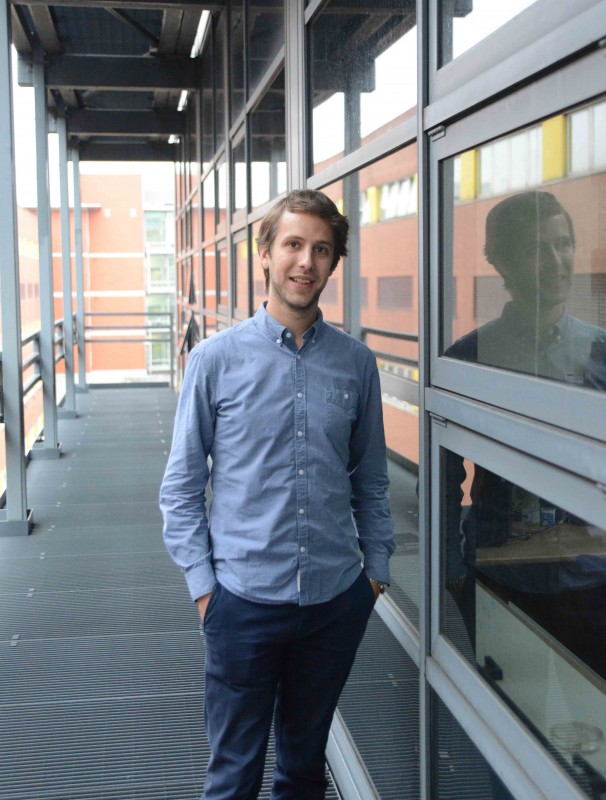By Sophie Arthur
October 5, 2018
Time to read: 5 minutes
 We have a great community of PhD students at the MRC London Institutes of Medical Sciences (LMS). As part of their training they all have the opportunity to apply for internships to complement their programme. Bertie Gyenes, member of the Behavioural Genomics Group, applied for the MRC/UKRI Policy Internship Scheme and spent 3 months working in the Policy Team at the Royal Society.
We have a great community of PhD students at the MRC London Institutes of Medical Sciences (LMS). As part of their training they all have the opportunity to apply for internships to complement their programme. Bertie Gyenes, member of the Behavioural Genomics Group, applied for the MRC/UKRI Policy Internship Scheme and spent 3 months working in the Policy Team at the Royal Society.
Bertie recently presented a talk to staff and students at the LMS about his time at the Royal Society. A key message that Bertie shared was thinking about science policy as the translation of science into decisions.
Bertie’s enthusiasm for science policy started with his interest in finding out how research and science actually get used, and how evidence bases can be formed.
“I wanted to know how my research would relate to policy and get translated. Using science expertise to help inform policy seems like a natural idea but establishing a good evidence base takes dedication and control. If you really believe something should be a certain way it’s sometimes quite easy to want to disregard the evidence. So it is essential to provide balanced and considered evidence-based suggestions to those making decisions, especially when those decisions could affect a lot of people.”
While the day-to-day experience is very different from pipetting in a lab, the work of the policy team incorporates rigorous research and evidence synthesis just as academic research does. Another important part of their job is facilitating discussion and bringing together the best people to consider particular questions. Bertie said,
“It was fast-paced with new things coming in throughout the week. But it was a lot of fun because it always remained manageable – even when it got somewhat hectic – thanks to the Royal Society’s great team who are incredibly experienced.”
There are a wealth of transferable skills and thinking that can arise from such internships, Bertie provided some examples,
“The internship provoked me to look at reviews from a different perspective, with a more focussed attention to detail, really critically reviewing each of the claims, before potentially using them as evidence within a policy talk or document. Another crucial element was being able to work together with others, to discuss issues, share ideas and make decisions in a more immediately collaborative way than scientists normally do.”
Bertie is an advocate for PhD students doing internships as they illustrate how transferable skills developed through PhDs can be applied to different sectors such as Science Policy,
“I really enjoyed my time at the Royal Society and getting to use some of my research skills to inform my work. It highlighted the importance of researchers informing policy and working with policy organisations to build a good evidence base.”
Internships are a great way to find out more about a specific industry and can lead to a career within that sector. We spoke to Dr Eva Sharpe, Head of Policy and Engagement at The Institute of Cancer Research (ICR). Eva completed her PhD at the Institute in the Cellular Stress group led by Dave Carling and co-supervised by Nav Navaratnam. She undertook a science policy internship at the Royal Society of Biology in 2010, and in 2011 was appointed HE Policy Officer. In 2013 Eva moved to The Institute of Cancer Research, initially as Science Information and Policy Manager and then promoted to Senior Policy and Engagement Manager in 2016. Following a secondment to the Greater London Authority in 2018 Eva returned to The ICR in her current role as Head of Policy and Engagement. She shared how the internship helped further her interest and career in policy
“The internship I did after my PhD gave me the chance to use my knowledge of the research environment outside of the lab. It also allowed me to see whether I was interested in policy as a career, as it was hard to know before trying it out. It’s quite a competitive field, and the experience also helped me secure my first job in science policy. In my role at the ICR I work closely with our scientists and leadership to develop the ICR’s position on a number of policy issues in scientific and medical research and run our public affairs programme to engage with our key political stakeholders. I like the fact that my work has a positive impact on the science community, and working at a research institute, I still get to go to conferences and seminars and feel part of the community.”
At LMS we offer a variety of support for our PhD students and see the benefits of such schemes. Our new PhD students started this week and applications for 2019 start open this coming Monday, 8 October, head to the PhD studentships page to find out more.
If you are a MRC PhD student interested in doing a policy internship the MRC/Academy of Medical Sciences Policy Internship scheme deadline has been extended to 24 October. If you are interested in doing a PhD at the Institute you can apply for an Imperial President’s Scholarship, first round deadline 22 October.